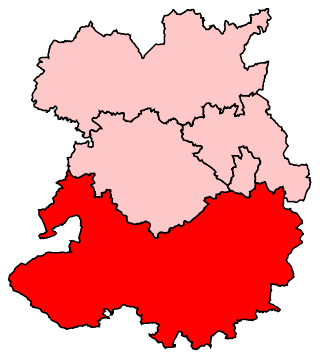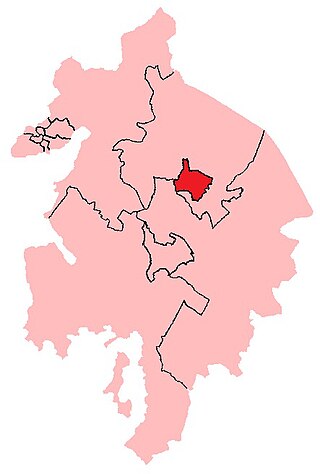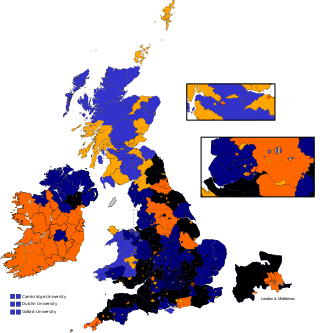| Warwick | |
|---|---|
| Former borough constituency for the House of Commons | |
| County | Warwickshire |
| Major settlements | Warwick |
| 1295–1885 | |
| Seats | Two |
| Replaced by | Warwick & Leamington |
Warwick was a parliamentary borough consisting of the town of Warwick, within the larger Warwickshire constituency of England. It returned two Members of Parliament (MPs) to the House of Commons of England from 1295 to 1707, to the House of Commons of Great Britain from 1707 to 1800, and then to the House of Commons of the Parliament of the United Kingdom until 1885[ citation needed ].
Under the Redistribution of Seats Act 1885, the constituency was abolished for the 1885 general election, when it was largely replaced by the new single-member constituency of Warwick and Leamington.
| Party | Candidate | Votes | % | ||
|---|---|---|---|---|---|
| Tory | Charles John Greville | Unopposed | |||
| Whig | John Tomes (MP) | Unopposed | |||
| Tory hold | |||||
| Whig hold | |||||
| Party | Candidate | Votes | % | ||
|---|---|---|---|---|---|
| Whig | John Tomes (MP) | 698 | 40.4 | ||
| Whig | Edward Bolton King | 523 | 30.3 | ||
| Tory | Charles John Greville | 505 | 29.3 | ||
| Majority | 18 | 1.0 | |||
| Turnout | 1,019 | c. 78.4 | |||
| Registered electors | c. 1,300 | ||||
| Whig hold | |||||
| Whig gain from Tory | |||||
| Party | Candidate | Votes | % | ±% | |
|---|---|---|---|---|---|
| Tory | Charles John Greville | 701 | 40.8 | +11.5 | |
| Whig | Edward Bolton King | 553 | 32.2 | +1.9 | |
| Whig | John Tomes (MP) | 463 | 27.0 | −13.4 | |
| Turnout | 1,248 | 93.1 | c. +14.7 | ||
| Registered electors | 1,340 | ||||
| Majority | 238 | 13.8 | N/A | ||
| Tory gain from Whig | Swing | +11.5 | |||
| Majority | 90 | 5.2 | +4.2 | ||
| Whig hold | Swing | −1.9 | |||
Greville's election was later declared void but no writ was issued for a by-election to elect a new MP.
| Party | Candidate | Votes | % | ±% | |
|---|---|---|---|---|---|
| Conservative | Charles John Greville | 564 | 38.7 | +18.3 | |
| Whig | Edward Bolton King | 478 | 32.8 | −26.4 | |
| Conservative | John Halcomb | 416 | 28.5 | +8.1 | |
| Turnout | 930 | 95.8 | +2.7 | ||
| Registered electors | 971 | ||||
| Majority | 86 | 5.9 | −7.9 | ||
| Conservative hold | Swing | +15.8 | |||
| Majority | 62 | 4.3 | −0.9 | ||
| Whig hold | Swing | −26.4 | |||
Greville resigned, causing a by-election.
| Party | Candidate | Votes | % | ±% | |
|---|---|---|---|---|---|
| Conservative | Charles Canning | 463 | 51.6 | −15.6 | |
| Whig | Henry William Hobhouse | 434 | 48.4 | +15.6 | |
| Majority | 29 | 3.2 | −2.7 | ||
| Turnout | 897 | 85.8 | −10.0 | ||
| Registered electors | 1,046 | ||||
| Conservative hold | Swing | −15.6 | |||
Canning was elevated to the peerage, becoming 1st Earl Canning and causing a by-election.
| Party | Candidate | Votes | % | ±% | |
|---|---|---|---|---|---|
| Whig | William Collins | 457 | 52.0 | +19.2 | |
| Conservative | John Adams | 422 | 48.0 | −19.2 | |
| Majority | 35 | 4.0 | −0.3 | ||
| Turnout | 879 | 86.8 | −9.0 | ||
| Registered electors | 1,013 | ||||
| Whig gain from Conservative | Swing | +19.2 | |||
| Party | Candidate | Votes | % | ±% | |
|---|---|---|---|---|---|
| Whig | William Collins | 498 | 35.4 | +19.0 | |
| Conservative | Charles Eurwicke Douglas | 468 | 33.3 | −33.9 | |
| Whig | Edward Bolton King | 439 | 31.2 | +14.8 | |
| Turnout | 909 | 89.7 | −6.1 | ||
| Registered electors | 1,013 | ||||
| Majority | 30 | 2.1 | −2.2 | ||
| Whig hold | Swing | +18.0 | |||
| Majority | 29 | 2.1 | −3.8 | ||
| Conservative hold | Swing | −33.9 | |||
| Party | Candidate | Votes | % | ±% | |
|---|---|---|---|---|---|
| Whig | William Collins | Unopposed | |||
| Conservative | Charles Eurwicke Douglas | Unopposed | |||
| Registered electors | 957 | ||||
| Whig hold | |||||
| Conservative hold | |||||
Douglas was appointed a commissioner of Greenwich Hospital, requiring a by-election.
| Party | Candidate | Votes | % | ±% | |
|---|---|---|---|---|---|
| Conservative | Charles Eurwicke Douglas | Unopposed | |||
| Conservative hold | |||||
| Party | Candidate | Votes | % | ±% | |
|---|---|---|---|---|---|
| Whig | William Collins | 443 | 50.3 | N/A | |
| Conservative | Charles Eurwicke Douglas | 407 | 46.3 | N/A | |
| Whig | Henry Roberts [17] | 30 | 3.4 | N/A | |
| Turnout | 440 (est) | 57.1 (est) | N/A | ||
| Registered electors | 770 | ||||
| Majority | 36 | 4.0 | N/A | ||
| Whig hold | Swing | N/A | |||
| Majority | 377 | 42.9 | N/A | ||
| Conservative hold | Swing | N/A | |||
| Party | Candidate | Votes | % | ±% | |
|---|---|---|---|---|---|
| Conservative | George Repton | 383 | 36.2 | +13.0 | |
| Conservative | Edward Greaves | 348 | 32.9 | +9.7 | |
| Whig | John Mellor [18] [19] | 327 | 30.9 | −22.8 | |
| Majority | 21 | 2.0 | −40.9 | ||
| Turnout | 693 (est) | 95.8 (est) | +38.7 | ||
| Registered electors | 723 | ||||
| Conservative hold | Swing | +12.2 | |||
| Conservative gain from Whig | Swing | +10.6 | |||
| Party | Candidate | Votes | % | ±% | |
|---|---|---|---|---|---|
| Conservative | George Repton | Unopposed | |||
| Conservative | Edward Greaves | Unopposed | |||
| Registered electors | 734 | ||||
| Conservative hold | |||||
| Conservative hold | |||||
| Party | Candidate | Votes | % | ±% | |
|---|---|---|---|---|---|
| Conservative | George Repton | Unopposed | |||
| Conservative | Edward Greaves | Unopposed | |||
| Registered electors | 721 | ||||
| Conservative hold | |||||
| Conservative hold | |||||
| Party | Candidate | Votes | % | ±% | |
|---|---|---|---|---|---|
| Conservative | George Repton | 342 | 35.8 | N/A | |
| Liberal | Arthur Peel | 315 | 33.0 | New | |
| Conservative | Edward Greaves | 297 | 31.1 | N/A | |
| Turnout | 635 (est) | 92.0 (est) | N/A | ||
| Registered electors | 690 | ||||
| Majority | 27 | 2.8 | N/A | ||
| Conservative hold | Swing | N/A | |||
| Majority | 18 | 1.9 | N/A | ||
| Liberal gain from Conservative | Swing | N/A | |||
| Party | Candidate | Votes | % | ±% | |
|---|---|---|---|---|---|
| Liberal | Arthur Peel | 873 | 43.7 | +10.7 | |
| Conservative | Edward Greaves | 863 | 43.2 | −23.7 | |
| Lib-Lab | Randal Cremer | 260 | 13.0 | N/A | |
| Turnout | 998 (est) | 59.1 (est) | −32.9 | ||
| Registered electors | 1,688 | ||||
| Majority | 10 | 0.5 | −1.4 | ||
| Liberal hold | Swing | +17.2 | |||
| Majority | 603 | 30.2 | +27.4 | ||
| Conservative hold | Swing | −17.2 | |||
| Party | Candidate | Votes | % | ±% | |
|---|---|---|---|---|---|
| Conservative | George Repton | 836 | 32.9 | +11.3 | |
| Liberal | Arthur Peel | 783 | 30.8 | −12.9 | |
| Conservative | Augustus Godson [20] | 740 | 29.1 | +7.5 | |
| Lib-Lab | Randal Cremer | 180 | 7.1 | −5.9 | |
| Turnout | 1,571 (est) | 94.4 (est) | +35.3 | ||
| Registered electors | 1,664 | ||||
| Majority | 53 | 2.1 | −28.1 | ||
| Conservative hold | Swing | +8.9 | |||
| Majority | 43 | 1.7 | +1.2 | ||
| Liberal hold | Swing | −11.2 | |||
| Party | Candidate | Votes | % | ±% | |
|---|---|---|---|---|---|
| Liberal | Arthur Peel | 981 | 40.5 | +9.7 | |
| Conservative | George Repton | 768 | 31.7 | −1.2 | |
| Conservative | Augustus Godson [20] | 676 | 27.9 | −1.2 | |
| Majority | 213 | 8.8 | +6.7 | ||
| Turnout | 1,703 (est) | 96.9 (est) | +2.5 | ||
| Registered electors | 1,758 | ||||
| Liberal hold | Swing | +5.2 | |||
| Conservative hold | Swing | −5.2 | |||

Ludlow was a constituency in Shropshire represented in the House of Commons of the UK Parliament.

Harwich was a parliamentary constituency represented in the House of Commons of the Parliament of the United Kingdom until its abolition for the 2010 general election.
Oxford was a parliamentary constituency in the United Kingdom, comprising the city of Oxford in the county of Oxfordshire.

Lancaster was a constituency of the House of Commons of the Parliament of England then of the Parliament of Great Britain from 1707 to 1800 and of the Parliament of the United Kingdom from 1801 to 1867, centred on the historic city of Lancaster in north-west England. It was represented by two Members of Parliament until the constituency was disenfranchised for corruption in 1867.
Bedfordshire was a United Kingdom Parliamentary constituency, which elected two Members of Parliament to the House of Commons of England from 1295 until 1707, then the House of Commons of Great Britain until 1801 and the House of Commons of the United Kingdom until 1885 when it was divided into two constituencies under the Redistribution of Seats Act 1885.
Liverpool was a borough constituency in the county of Lancashire of the House of Commons for the Parliament of England to 1706 then of the Parliament of Great Britain from 1707 to 1800 and of the Parliament of the United Kingdom from 1801 to 1885. It was represented by two Members of Parliament (MPs). In 1868, this was increased to three Members of Parliament.
Hertford was the name of a parliamentary constituency in Hertfordshire, which elected Members of Parliament (MPs) from 1298 until 1974.
Woodstock, sometimes called New Woodstock, was a parliamentary constituency in the United Kingdom named after the town of Woodstock in the county of Oxfordshire.

Barnstaple was a constituency centred on the town of Barnstaple in Devon, in the South West of England. It returned two Members of Parliament to the House of Commons of the Parliament of the United Kingdom until 1885, thereafter, one.
Pontefract was an English parliamentary constituency centred on the town of Pontefract in the West Riding of Yorkshire, which returned two Members of Parliament to the House of Commons briefly in the 13th century and again from 1621 until 1885, and one member from 1885 to 1974.
Rutland was a parliamentary constituency covering the county of Rutland. It was represented in the House of Commons of the Parliament of the United Kingdom until 1918, when it became part of the Rutland and Stamford constituency, along with Stamford in Lincolnshire. Since 1983, Rutland has formed part of the Rutland and Melton constituency along with Melton Mowbray from Leicestershire.
Southampton was a parliamentary constituency which was represented in the English and after 1707 British House of Commons. Centred on the town of Southampton, it returned two members of parliament (MPs) from 1295 until it was abolished for the 1950 general election.
Norwich was a borough constituency in Norfolk which was represented in the House of Commons of England from 1298 to 1707, in the House of Commons of Great Britain from 1707 to 1800, and in the House of Commons of the United Kingdom from 1801 until it was abolished for the 1950 general election. Consisting of the city of Norwich in Norfolk, it returned two members of parliament (MPs), elected by the bloc vote system.
New Shoreham, sometimes simply called Shoreham, was a parliamentary borough centred on the town of Shoreham-by-Sea in what is now West Sussex. It returned two Members of Parliament (MPs) to the House of Commons of England from 1295 to 1707, then to the House of Commons of Great Britain until 1800, and finally to the House of Commons of the Parliament of the United Kingdom from 1801 until it was abolished by the Redistribution of Seats Act 1885, with effect from the 1885 general election.
South Warwickshire was a parliamentary constituency in the county of Warwickshire in England. It returned two Members of Parliament (MPs) to the House of Commons of the Parliament of the United Kingdom, elected by the first past the post system.
Cockermouth was the name of a constituency of the House of Commons of the Parliament of England in 1295, and again from 1641, then of the Parliament of Great Britain from 1707 to 1800 and of the Parliament of the United Kingdom from 1801 to 1918. It was a parliamentary borough represented by two Members of Parliament until 1868, and by one member from 1868 to 1885. The name was then transferred to a county constituency electing one MP from 1885 until 1918.

Coventry was a borough constituency which was represented in the House of Commons of England and its successors, the House of Commons of Great Britain and the House of Commons of the United Kingdom.
Wilton was the name of a parliamentary borough in Wiltshire. It was represented in the House of Commons of the Parliament of England from 1295 to 1707, then in the Parliament of Great Britain from 1707 to 1800 and finally in the House of Commons of the United Kingdom of the Parliament of the United Kingdom from 1801 to 1918. It had two Members of Parliament (MPs) until 1832, but from 1832 to 1885 only one member, as a result of the Reform Act 1832 where it also absorbed the former rotten borough of Old Sarum. In 1885 the borough was abolished, but the name of the constituency was then transferred to a new county constituency electing one Member from 1885 until 1918.

Dorset was a county constituency covering Dorset in southern England, which elected two Members of Parliament (MPs), traditionally known as knights of the shire, to the House of Commons of England from 1290 until 1707, to the House of Commons of Great Britain from 1707 to 1800, and to the House of Commons of the United Kingdom until 1832.
Sandwich was a parliamentary constituency in Kent, which elected two Members of Parliament (MPs) to the House of Commons from 1366 until 1885, when it was disfranchised for corruption.